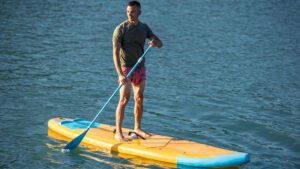The rules and regulations for kayaking within Texas are set and enforced by the Texas Parks and Wildlife Department (TPWD).
Whether you’re kayaking or boating, learning about Texas water safety laws is compulsory. Let’s take a look at them.
Texas Kayak Laws
Below is a summary of kayaking laws in Texas, enforced by the game wardens and the Law Enforcement Division of the Texas Wildlife Department:
- Texas boating safety law states that at least one wearable Type I, II, III, or V Personal Flotation Device should be aboard. The PFDs should be readily accessible at all times
- The Personal Flotation device should be of appropriate size and serviceable condition for the intended user.
- Non-motorized vessels such as kayaks and canoes are exempted from boating registration requirements.
- Boating while intoxicated is prohibited by Texas boating and water safety laws. The boater can be charged with BUI.
- People under 13 years of age must wear their life jacket while on board of a vessel underway that is less than 26 feet in length.
- Everyone on a personal watercraft must wear a U.S. Coast Guard-approved Type I, II, III or V life jacket.
- All vessels less than 16 feet, including canoes and kayaks, must carry with it at least one Type I, II, III, or V for each occupant.
- All vessels are required to carry visual distress signals devices. Manually propelled watercraft are exempt from carrying day signaling devices.
- On coastal waters, all vessels are required to carry US Coast Guard approved night VDS devices to ensure smooth sailing.
- Powered vessels require United States Coast Guard approved red and green side lights as well as a white lights all-around when not at dock.
- One whistle, horn, or other sound-producing device capable of producing an efficient sound that can signal position in times of reduced visibility is required.
- All vessels with an internal combustion engine (this includes motorized kayaks) anywhere in the State of Texas must have at least one fire extinguisher.
Explaining The Laws Regarding Life Jackets And Personal Flotation Device (PFDs)
As mentioned before all vessels above 14 feet in length must have a approved wearable PFD. These USCG approved PFD should account for every person onboard. A Type V life jacket must be used according to the specific instructions on the label of the device.
Vessels that are 16 feet or longer, must be equipped with one Type IV throwable personal floatation device. Children younger than the age of 13 must wear a life jacket at all times while on a vessel
These conditions are set by the the law makers to ensure the safety of every person on board in case of an accident.
Operating A Watercraft While Intoxicated
Alcoholic beverages impairs a boater’s capacity for safe navigation. There is an established Blood Alcohol Content (BAC) limit for operating any form of watercraft.
Texas’s boating laws states that, a boater with the blood alcohol content of 0.08 % or more is presumed to be under the influence of alcohol.
These are the penalties for breaking the BWI laws according to Texas boating laws:
- First conviction is punishable by a fine of up to $2,000 or jail time of up to 180 days.
- Second conviction is punishable by a fine of up to $4,000 or jail time of up to one year.
- Third conviction is punishable by a fine of up to $10,000 or jail time of up to 10 years.
Boater Education Course And Age Of Operating A Personal Watercraft

Boater education safety course is mandatory for anyone born on or after September 1, 1993, to operate a Personal Watercraft (PWC). This also includes sailboat more than 14 feet long, or motorboat with a motor greater than 15 horsepower.
Texas Kayak Laws Regarding Title and Registration
All vessels powered by a motor (including canoes or kayaks with trolling motors) are required to be titled and registered under the regulation of Texas Parks and Wildlife, to lawfully operate on public waters.
Under the law a child can only operate a watercraft if they are under the supervision of an adult who is at least 18 years of age.
Conclusion
Now that you are aware of all the laws regarding water safety, you can paddle your way through the Texas waterways. Remember, to keep your registrations on board at all times in case inspection officer comes.




